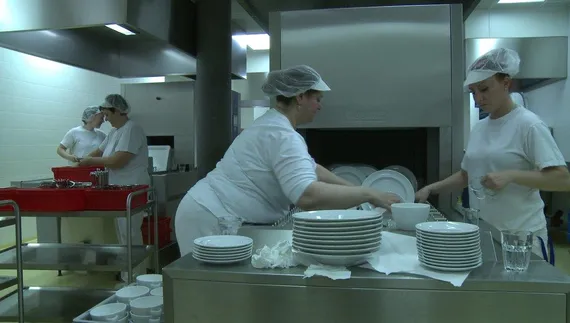
Sanja Iveković, 'The Invisible Women of Erste Campus', 2016

Sanja Iveković, The Invisible Women of Erste Campus, 2016 © Erste Group Bank AG
Film Project, Elevator areas, Level 0–9, Building A–F
Sanja Iveković has dedicated a filmic portrait to the “invisible” women of the Erste Campus, those workers who clean the offices in the early morning and evening and staff the cafeterias and kitchens. In keeping with her feminist approach, the artist investigates just why the Erste Campus cleaning women’s physical labor is invisible. She explores the situation of the company’s exclusively immigrant cleaning personnel, the working conditions they encounter, the effects of the building’s modern architecture, the Erste Campus workplace philosophy on their work, and the compatibility of their jobs with their private lives. To accomplish this, Iveković accompanied these women on the job with her camera over an extended period of time. She also conducted numerous interviews—not just with these women, but also with Erste Group’s CEO, with employee representatives, with activists, with the women’s supervisors, and with the architects who designed the Erste Campus. Some of the findings from this “field research” are shown in combination with portraits of these women on monitors installed at various locations throughout the building. In their film segments, these women also recite poems of their own selection that were written by Croatian author Aida Bagić in their respective native tongues. These texts revolve around migrant experiences, the quest for personal life plans, yearnings, disillusionment, and the hope for a better life. Sanja Iveković thus supports the potential of self-empowerment: her artistic project lends these women a voice and makes them visible agents of a working process.
Sanja Iveković, born in 1949, lives and works in Zagreb. At the beginning of the 1970s, she was one of the first artists in former Yugoslavia to begin taking an explicitly feminist approach in her work. Her early projects focused on the performative potential of mass media, magazines, newspapers, advertising, and public and private photography, involving her own person as a structural and referential figure in an expanded form of representation. The themes of representation and the status of women in our society are also central to her present-day work. Iveković has received numerous prizes and awards at film and video festivals, including those of Locarno and Montreal. She has also participated in several biennials including documenta 8, 11, and 13 in Kassel and Manifesta 2 in Luxembourg, as well as in exhibitions at the Museum of Modern Art in New York, the Taxispalais in Innsbruck, the Museu d’Art Contemporani in Barcelona, the Van Abbemuseum in Eindhoven, the Museum moderner Kunst in Vienna, the Fundació Antoni Tapiès in Barcelona, and the Museum of Contemporary Art in Los Angeles.
Text: Kathrin Rhomberg & Pierre Bal-Blanc

